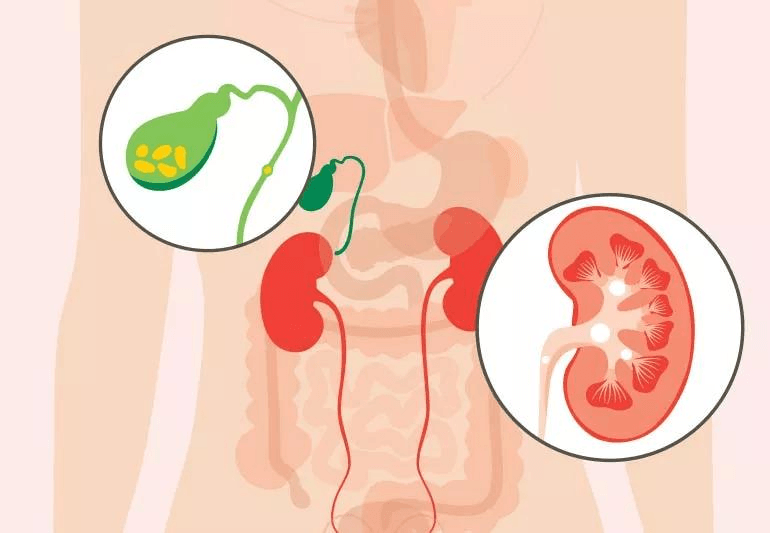Introduction
Kidney and gallbladder stones, also known as renal calculi and cholelithiasis respectively, are common health issues that affect millions of people worldwide. Conventional medicine offers various treatments, but Ayurveda, the ancient system of medicine from India, provides a holistic approach to managing and potentially preventing these conditions. This article explores Ayurvedic treatments for kidney and gallbladder stones, emphasizing natural remedies, lifestyle modifications, and dietary guidelines.
Understanding Kidney and Gallbladder Stones in Ayurveda
In Ayurveda, kidney and gallbladder stones are primarily considered imbalances of the doshas—Vata, Pitta, and Kapha. The formation of stones is linked to an excess of certain doshas, leading to the accumulation of toxins (ama) in the body.
- Kidney Stones (Renal Calculi): Often attributed to an excess of Pitta dosha, kidney stones can result from imbalanced metabolic processes leading to the formation of mineral deposits. Ayurveda categorizes them as a result of an aggravated Pitta dosha that affects the urine and its composition.
- Gallbladder Stones (Cholelithiasis): Gallstones are commonly associated with an imbalance in Pitta dosha, which leads to the formation of hardened bile. This can be due to dietary habits, improper digestion, or stress.
Ayurvedic Treatments for Kidney Stones
1. Herbal Remedies
- Chanca Piedra (Phyllanthus niruri): Known as the “stone breaker,” this herb is traditionally used to help dissolve kidney stones and ease their passage. It is believed to reduce the size of stones and relieve pain.
- Punarnava (Boerhavia diffusa): This herb has diuretic properties that help flush out stones and reduce swelling in the kidneys.
- Gokshura (Tribulus terrestris): This herb helps in reducing the formation of stones by supporting kidney function and promoting urine flow.
2. Dietary Guidelines
- Stay Hydrated: Drinking plenty of water is crucial. Ayurveda suggests drinking warm water or herbal teas to help dissolve and flush out stones.
- Avoid Excessive Salt and Spices: Excessive salt and spicy foods can aggravate Pitta and contribute to stone formation. Opt for a balanced diet with cooling herbs like coriander and fennel.
- Include Pitta-Pacifying Foods: Foods such as cucumber, watermelon, and coconut water help balance Pitta and support kidney health.
3. Lifestyle Modifications
- Regular Exercise: Engage in moderate physical activity to promote overall health and prevent stagnation, which can contribute to the formation of stones.
- Routine Check-ups: Regular consultations with an Ayurvedic practitioner can help monitor the condition and prevent recurrence.
Ayurvedic Treatments for Gallbladder Stones
1. Herbal Remedies
- Turmeric (Curcuma longa): Known for its anti-inflammatory and liver-supporting properties, turmeric helps in reducing bile duct inflammation and dissolving stones.
- Milk Thistle (Silybum marianum): This herb supports liver function and helps detoxify the body, which may aid in the prevention and management of gallstones.
- Dandelion Root (Taraxacum officinale): Dandelion root helps stimulate bile production and supports gallbladder health.
2. Dietary Guidelines
- Opt for a Low-Fat Diet: Reducing dietary fat intake can help prevent the formation of gallstones. Focus on whole grains, fresh fruits, and vegetables.
- Increase Fiber Intake: Foods rich in fiber such as oats, barley, and legumes help maintain digestive health and prevent stone formation.
- Include Bitter Foods: Bitter-tasting foods like bitter gourd and fenugreek can stimulate bile production and promote gallbladder health.
3. Lifestyle Modifications
- Regular Meals: Eating smaller, regular meals helps maintain steady bile flow and reduces the risk of stone formation.
- Manage Stress: Chronic stress can exacerbate Pitta imbalance. Incorporate relaxation techniques such as yoga and meditation to manage stress effectively.
Conclusion
Ayurveda offers a holistic approach to treating and preventing kidney and gallbladder stones through a combination of herbal remedies, dietary adjustments, and lifestyle modifications. By addressing the root cause of these conditions—imbalance in the doshas—Ayurvedic treatments aim to restore harmony and promote overall well-being. As always, it is advisable to consult with a qualified Ayurvedic practitioner before starting any new treatment regimen, especially if you are already undergoing conventional medical treatment. Embracing Ayurvedic principles can complement traditional treatments and support long-term health and vitality.

